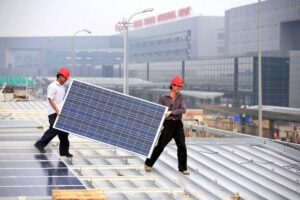Neoen’s Capital battery in Canberra has become the latest project to experience major connection delays, with full commissioning now not expected until 2024, instead of original plan of the first half of 2023.
Construction of the 100MW, two hour (200 MWh) Capital battery, located near the Queanbeyan sub-station, was finished earlier this year, and the photo above was published by the EPC contractor Doosan Gridtech in March.
A video posted on the project website, also in March, said the battery was expected to be in production before the end of June.
But Neoen CEO Xavier Barbaro revealed late last week in a call with investors that the battery’s full commissioning has been delayed and is now not expected until the first half of 2024.
“The Capital battery commissioning is now expected in 2024,” Barbaro told the investor call. “The connection compliance tests under the direct responsibility of the EPC contractor are taking much more time than initially expected.”
The Capital battery is being supplied by Korean company Doosan Gridtech, which won the engineering, procurement and construction (EPC) services, and will install 627 lithium ion battery units provided by China’s CATL.
Neoen committed to build the Capital big battery in Canberra as part of the tender win in 2020 with the ACT government that also underwrote the construction of the 412 MW first stage of the Goyder wind farm in South Australia.
The original plan was to build a 50 MW/100 MWh battery, but Neoen doubled the size after signing a seven-year 70 MW “virtual battery contract” with AGL Energy, which allows the electricity retailer to hedge its customer load by virtually charging or discharging the battery.
Delays in connections have reached plague proportions in the Australian renewables and storage industry, although details are often scarce. The problems are various cited as a lack of resources, complexity, faulty equipment, incorrect installations or other problems, such as the need for so called “harmonic filters.”
Battery projects have also been affected by these delays, including the Torrens Island big battery in South Australia, now in full operation, and the Broken Hill battery.
Neoen is obliged to provide updates because of its status as a listed entity, and it has previously described delays – along with claims for liquidated damages from the responsible contractors – at the Western Downs solar farm in Queensland, the Bulgana green energy hub in Victoria, and its smaller NSW solar farms.
Barbaro said there were some liquidity damages at stake in the Capital contract. “It is not especially making us nervous, we do have some comfort in the level of liquidity damages we have in place because that is in the price that we pay for the EPC contract,” he said.
Barbaro said it was difficult to estimate if the liquidated damages would cover the potential revenue lost from the delays because of the volatile nature of revenues from battery storage assets.
“Maybe we are going to get less than what we could have made in the market, maybe in the end we are going to get more. On average we plan to get something that is good enough to offset the effect of the delays we are incurring.”
He said liquidated damages in other projects had delivered more than expected revenues in some cases, and less in other cases.
Neoen has been Australia’s most successful battery storage developers, responsible for the original Tesla Big Battery at Hornsdale, built in 2017, and followed by the Victoria Big Battery (300 MW/450 MWh) and the Bulgana big battery (20 MW/32 MWh), both in Victoria.
It is also building the Western Downs battery (270 MW/540 MWh, the Blyth battery (200 MW/400 MWh) in South Australia, and its first four-hour big battery at Collie (219 MW/877 MWh) in Western Australia.
All its battery storage projects – with the exception of the Capital battery and the Blyth battery (NHOA) – have been supplied by Tesla.
Neoen also had a small battery (6MW/1.4MWh) – installed at the Degrussa copper mine in Western Australia, alongside a small solar farm (10.6MW) but the contract has ended as planned, and the panels and modules may be sold depending on any decision to close or continue the mine by the facility’s owner.
See the details of Neoen’s latest quarterly report here: Hangover from battery party and contract for biggest solar farm crimp Neoen revenues










